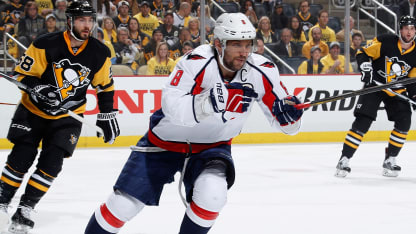"When we're at our best as a team, we've got a four-line rotation," Sullivan said. "We think that's one of our strengths,'' Sullivan said. "So, do we look for matchups that are advantageous? Sure, we do. And we'll continue to do that. We have a little bit more control at home than we do on the road."
3. ALEX OVECHKIN
As much as the Capitals need other players to step up and produce, particularly at even strength (paging Kuztnetsov), how Ovechkin goes, they usually follow. They won Game 5 with Ovechkin dominating, controlling the puck, scoring a power-play goal and assisting on Oshie's game-winner.
If the Penguins can keep Ovechkin quiet, that enhances their chances of advancing to the Eastern Conference Final for the first time since 2013.
"This team plays well when we have some pressure," Ovechkin said. "Last game, we showed we have character and we showed we support each other and trust each other. The last game is over and [Tuesday] is going to be the biggest game of the year. I think we're ready."
4. PENALTY KILL ADJUSTMENTS
The power plays came to life in Game 5. The Capitals went 2-for-5 with the man-advantage after going 1-for-12 in the first four games and the Penguins went 1-for-2 after going 0-for-14 in the first four games.
Both teams moved the puck well and created numerous chances. Was this a one-game aberration, or did they finally solve the penalty kills?
"You go through a long series and you give a team enough opportunities on the power play, and they're bound to score one here or there," Penguins center Matt Cullen said. "For us, it's about eliminating and reducing their opportunities, and then we've got to execute a little bit better. We didn't do a great job on faceoffs and we didn't do a great job taking away time and space, and that hurt us."




















